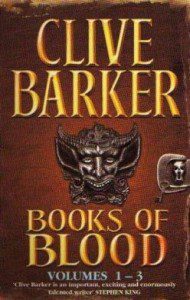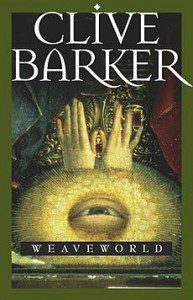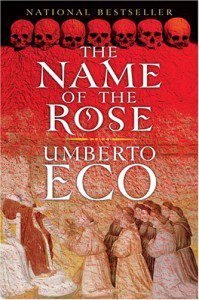 So, as today is World Book Day, I’ve been asked to talk about my favourite book. Well, that should be easy, right? Well, in my case, no, because what my favourite book is changes on a very regular basis. It depends on the prevailing mood my mind is in at any one time, plus it’s affected by what’s going on around me. So, rather than talk about a specific favourite book, here are a few that have caught my eye over the years.
So, as today is World Book Day, I’ve been asked to talk about my favourite book. Well, that should be easy, right? Well, in my case, no, because what my favourite book is changes on a very regular basis. It depends on the prevailing mood my mind is in at any one time, plus it’s affected by what’s going on around me. So, rather than talk about a specific favourite book, here are a few that have caught my eye over the years.
Books of Blood
The best place to start, I suppose, are a few pieces written by my favourite author, Clive Barker. As I’ve mentioned elsewhere, his work essentially helped me redefine my approach to, and vision of, ‘horror’ fiction. Much of the material I’d read before I picked up the first of his Books of Blood were classic examples of what most people would think of as ‘horror’ i.e. blood, guts and general unpleasantness, often just for the sake of being nasty in some instances. Similar themes feature in Barker’s work, but the main difference between his and a thousand other hack writers’ work is the poetic lyricism of his prose and the breadth of his vision. In many ways, Barker brought a clear literacy to the then moribund state of the horror fiction genre – and in the process gave it a much needed boot up the posterior.
The Books of Blood volumes are indeed a good starting point for people wanting an introduction to the man’s work, but here I will point instead to three works of his that majorly changed my perceptions in various ways. The first is Cabal, the novella that eventually got made into the film Nightbreed (and one of my favourites). Here, Barker cleverly turned the definition of just who the monsters were completely on its head – the mutant creatures hiding below the grounds of an isolated cemetery, or the humans who persecuted them? Or was it Boone, the unsettled and insecure main protagonist, or Decker, the psychiatrist tasked with his Boone’s treatment? Here the lines blur deliciously, in the process pushing the reader to think about his/her own preconceptions of what constitutes the so-called eternal verities of good and evil.
Weaveworld
 Then there’s Weaveworld which, when I eventually read it, metaphorically took my brain, stretched it until it couldn’t take anymore, atomised the hell out of it and scattered what was left of it to all eleven dimensions of the known universe. Despite its superficially simple premise (that of a whole world contained within the strands of a unique carpet), it’s an extraordinarily complex exploration of what happens when the world of the everyday is abruptly ruptured by an invasion of the fantastical, as well as of the nature of good and evil and how we think of it. The work is also deeply infused with religious references, especially in some of the character names used – this helps to lend the novel the idea that the world contained within the carpet is an ideal, an otherworld which is the greatest prize of all. On a more superficial level, this is also a novel where many of the strands and themes explored in Barker’s previous outings finally come together, where urban fantasy, the phantastic and horror all converge into a magnificent whole.
Then there’s Weaveworld which, when I eventually read it, metaphorically took my brain, stretched it until it couldn’t take anymore, atomised the hell out of it and scattered what was left of it to all eleven dimensions of the known universe. Despite its superficially simple premise (that of a whole world contained within the strands of a unique carpet), it’s an extraordinarily complex exploration of what happens when the world of the everyday is abruptly ruptured by an invasion of the fantastical, as well as of the nature of good and evil and how we think of it. The work is also deeply infused with religious references, especially in some of the character names used – this helps to lend the novel the idea that the world contained within the carpet is an ideal, an otherworld which is the greatest prize of all. On a more superficial level, this is also a novel where many of the strands and themes explored in Barker’s previous outings finally come together, where urban fantasy, the phantastic and horror all converge into a magnificent whole.
But, Weaveworld is just the prologue to something even more marvellous – his follow-up novel Imajica. This work is the culmination of everything that Barker was striving to achieve through his writing. Fantasy, science-fiction, and horror, combined with the themes of the nature of God, life, love, sex and death and their human interfaces, intertwine into what I consider to be a masterpiece of the highest order, a literary tour-de-force. There are Five Dominions, of which Four are already reconciled and the Fifth, Earth, is yet to join the others. At its most basic, the story is essentially a quest across space and time to help bring about the Reconciliation of the Fifth Dominion with the remaining Four, especially now that the time for that Reconciliation is most apposite. However, that doesn’t even begin to touch upon the beauty of this tale in all its mind-numbing, horrific and star-spanning glory. It utterly blew me away, indeed did so in a way that no other book had done up to that point (or since, it has to be noted) and once again my definition of what could be done within genre was stretched beyond breaking point. Indubitably, Imajica left an indelible impression on me that has refused to go away and every once in a while I get an urge to revisit the worlds that Barker invested with such realism and potency.
Having said all that, it could quite legitimately be argued that both Weaveworld and Imajica aren’t really anything to do with horror, but I would suggest that it has got everything to do with it. Aside from any deliberately visceral scenes in the book, there’s also the sheer vastness and scale of the Five Dominions and the space they occupy, compared to the human mind that attempts to comprehend it. The world we know and consider to be the most important is in fact but an infinitesimally miniscule atom within a universe much larger than we can ever imagine it to be. Indeed, what I want from my ‘horror’ literature is something vastly more than the narrow confines of what most people think it is and the works of Barker fulfil that criterion magnificently, expanding the flavour of the genre into something truly ‘other’.
Redefining Horror
 Now, moving on, the next novel is one that people are going to argue with me about, as they will undoubtedly dismiss it as being as far removed from horror as it’s possible to get – or so they think. I will argue that, in some senses, that the work in question, The Name of the Rose by Umberto Eco, CAN be said to have elements of horror within it (even though it’s billed as a mystery), albeit of suggestive supernatural ones, which may, or may not, be actually happening. Eco’s accurate evocation of the claustrophobia and oppression of the medieval monastic life is second to none – demons and devils, both real and imagined, abound in the novel, so you’re never quite sure what is going on. Everything is imbued with menace and seething terror. From the perspective of the 21st century, the Middle Ages was one, long unending nightmare of superstition and ignorance, where the malign presence of the elemental otherworld of paganism and heathenism impinged on the real one. Moreover, that presence was palpable and could be felt by everyone. Eco veritably saturates his medieval world with this sullen atmosphere, and it’s a wonderfully realised, shiver-inducing world it is, too. For me, horror isn’t necessarily about monsters, or ghosts, or supernatural entities – it’s about atmosphere and milieu, and if the writer gets that right then a whole fabric of horror is yours to experience.
Now, moving on, the next novel is one that people are going to argue with me about, as they will undoubtedly dismiss it as being as far removed from horror as it’s possible to get – or so they think. I will argue that, in some senses, that the work in question, The Name of the Rose by Umberto Eco, CAN be said to have elements of horror within it (even though it’s billed as a mystery), albeit of suggestive supernatural ones, which may, or may not, be actually happening. Eco’s accurate evocation of the claustrophobia and oppression of the medieval monastic life is second to none – demons and devils, both real and imagined, abound in the novel, so you’re never quite sure what is going on. Everything is imbued with menace and seething terror. From the perspective of the 21st century, the Middle Ages was one, long unending nightmare of superstition and ignorance, where the malign presence of the elemental otherworld of paganism and heathenism impinged on the real one. Moreover, that presence was palpable and could be felt by everyone. Eco veritably saturates his medieval world with this sullen atmosphere, and it’s a wonderfully realised, shiver-inducing world it is, too. For me, horror isn’t necessarily about monsters, or ghosts, or supernatural entities – it’s about atmosphere and milieu, and if the writer gets that right then a whole fabric of horror is yours to experience.
Finally, I’ll talk about one of my favourite collections by a single author – MR James’ The Collected Ghost Stories. Despite being written mostly for the amusement of both himself and that of his close friends on Christmas Eve, and also despite the fact they were written nigh on a century ago now, they still retain a magnificent power to chill and disturb. Classics such as Casting the Runes (which provided the base for the equally classic 1950s film Night of the Demon, directed by Jacques Tourneur), Oh Whistle and I’ll Come to You my Lad and A Warning to the Curious evoke stark terrors, not through explicit description, but through a careful build-up of mounting tension and suspense that pull naggingly on the nerves. Many a modern writer cites James as an honourable influence and antecedent, as his ability to pull people in from innocuous beginnings to horrible final revelation is almost unmatched, and in some cases never bettered. If there’s one classic ghost story collection that’s an absolutely essential requisition for any horror and ghost story lover’s library, then MR James’ collected stories is it.
So, these are my favourite things when it comes to horror literature – they may not be what everybody would consider to be horror in the classic sense, but I’ve come to learn over the years that the genre really has no set definitions or limitations, only those we choose to impose upon it. As I intimated above, my preferred kind of horror is a style that perhaps goes beyond the usual, but like I also say, that’s the beauty of horror as a genre – it’s infinitely elastic and flexible. And that is how it should be.
SIMON MARSHALL-JONES










1 comment
Thanks for sharing this. I, too, grew up a huge Barker fan, although I haven’t been as keen of his work of late. However, in beginning, he really shaped the young writer within me, with The Books of Blood, The Great and Secret Show and even The Thief of Always. Perhaps I’ll have to see what he’s up to these days and perhaps rediscover one of my old masters.
-Jimmy